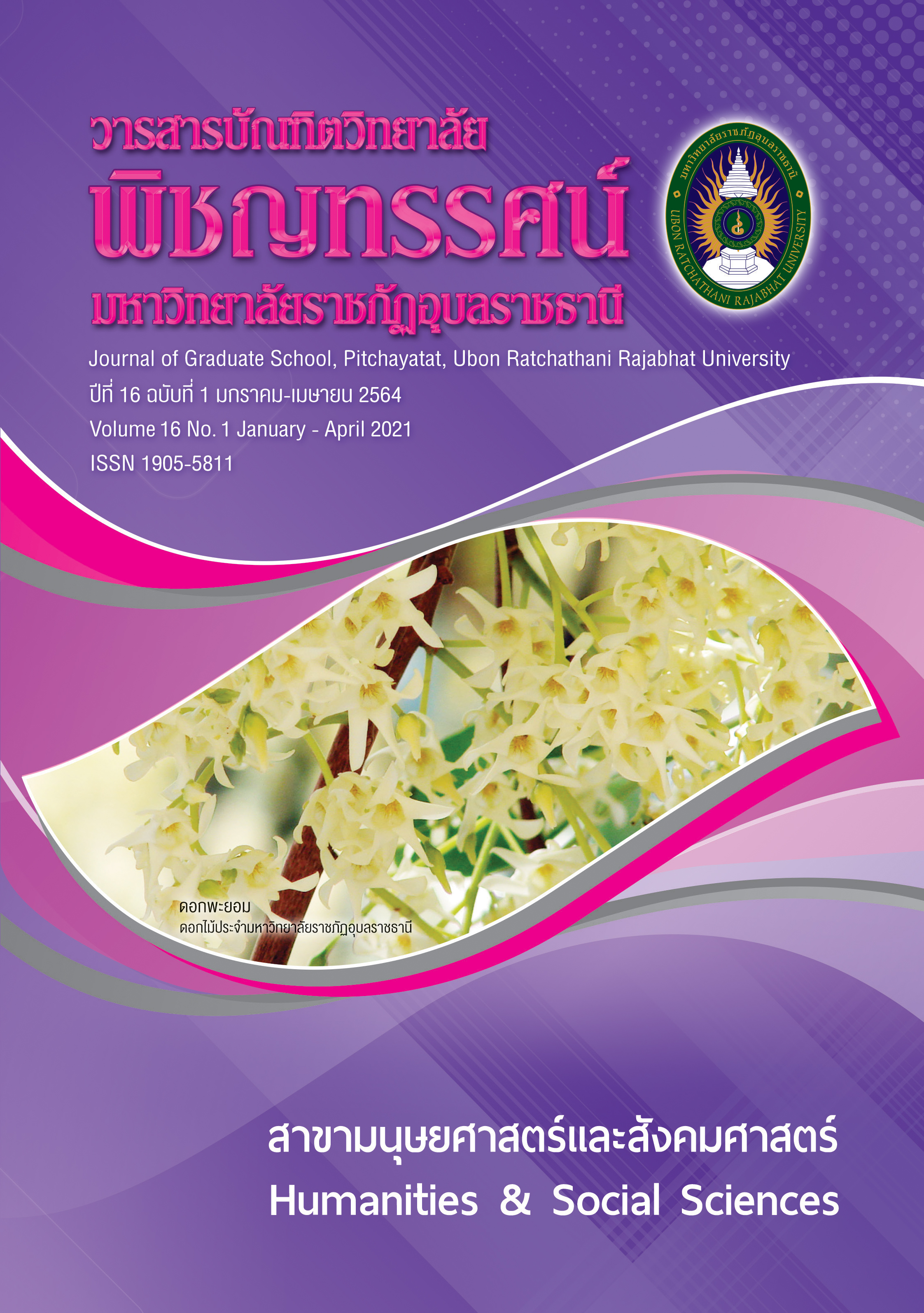โปรแกรมพัฒนาครูด้านการจัดการเรียนรู้สำหรับสถานศึกษา สังกัดสำนักงานเขตพื้นที่การศึกษาประถมศึกษา มหาสารคาม เขต 1
คำสำคัญ:
การพัฒนาครู, การจัดการเรียนรู้บทคัดย่อ
การวิจัยครั้งนี้มีความมุ่งหมายเพื่อ 1) ศึกษาสภาพปัจจุบันและสภาพที่พึงประสงค์การจัดการเรียนรู้ของครูสำหรับสถานศึกษา สังกัดสำนักงานเขตพื้นที่การศึกษาประถมศึกษามหาสารคาม เขต 1 2) พัฒนาโปรแกรมพัฒนาครูด้านการจัดการเรียนรู้สำหรับสถานศึกษา สังกัดสำนักงานเขตพื้นที่การศึกษาประถมศึกษามหาสารคาม เขต 1การวิจัยแบ่งออกเป็น 2 ระยะ คือ ระยะที่ 1 ศึกษาสภาพปัจจุบัน และสภาพที่พึงประสงค์การจัดการเรียนรู้สำหรับสถานศึกษา สังกัดสำนักงานเขตพื้นที่การศึกษาประถมศึกษามหาสารคาม เขต 1 กลุ่มตัวอย่างคือ ผู้บริหารสถานศึกษาและครูผู้สอนจำนวน 324 คน โดยการเทียบจำนวนประชากรทั้งหมดกับตารางกำหนดขนาดกลุ่มตัวอย่างของ Krejcie and Morgan และใช้เทคนิคการสุ่มแบบแบ่งชั้น (Stratified Random Sampling Technique) ระยะที่ 2 พัฒนาโปรแกรมพัฒนาครูด้านการจัดการเรียนรู้สำหรับสถานศึกษา สังกัดสำนักงานเขตพื้นที่การศึกษาประถมศึกษามหาสารคาม เขต 1 กลุ่มผู้ให้ข้อมูล ได้แก่ ผู้บริหารสถานศึกษา 1 คน และครูผู้รับผิดชอบงานวิชาการ 1 คน จำนวน 2 โรงเรียน และผู้ทรงคุณวุฒิประเมินความเหมาะสมและความเป็นไปได้ของโปรแกรมพัฒนาครูด้านการจัดการเรียนรู้สำหรับสถานศึกษาสังกัดสำนักงานเขตพื้นที่การศึกษาประถมศึกษามหาสารคาม เขต 1 จำนวน 5 คน โดยการเลือกแบบเจาะจง (Purposive Sampling) เครื่องมือที่ใช้ในการวิจัย ได้แก่ แบบสอบถาม แบบสัมภาษณ์ แบบบันทึกการสนทนากลุ่ม และแบบประเมินโปรแกรม สถิติที่ใช้ในการวิเคราะห์ข้อมูล ได้แก่ ร้อยละ ค่าเฉลี่ย ส่วนเบี่ยงเบนมาตรฐาน ค่าความเชื่อมั่น และเทคนิค Modified Priority Needs Index (PNI modified )
ผลการวิจัย พบว่า
- สภาพปัจจุบันการจัดการเรียนรู้โดยรวมอยู่ในระดับมาก และสภาพที่พึงประสงค์ของการพัฒนาครูด้านการจัดการเรียนรู้สำหรับสถานศึกษาสังกัดสำนักงานเขตพื้นที่การศึกษาประถมศึกษามหาสารคาม เขต 1 โดยรวมอยู่ในระดับมากที่สุด
- โปรแกรมพัฒนาครูด้านการจัดการเรียนรู้สำหรับสถานศึกษา สังกัดสำนักงานเขตพื้นที่การศึกษาประถมศึกษามหาสารคาม เขต 1 ประกอบด้วย 5 องค์ประกอบ 1) หลักการ 2) วัตถุประสงค์ 3) เนื้อหา 4) วิธีการพัฒนา 5) การประเมินผล จากการประเมินความเหมาะสมและความเป็นไปได้ของโปรแกรมโดยรวมอยู่ในระดับมาก
เอกสารอ้างอิง
กลุ่มนโยบายและแผนสำนักงานเขตพื้นที่การศึกษาประถมศึกษามหาสารคาม เขต 1. แผนปฏิบัติการประจำปีงบประมาณ พ.ศ. 2562. มหาสารคาม: สำนักงานเขตพื้นที่การศึกษาประถมศึกษามหาสารคาม เขต 1, 2562.
กลุ่มสถิติและวิเคราะห์สภาวะทางการศึกษา. สมรรถนะการศึกษาไทยในเวทีสากล พ.ศ. 2558 (IMD2015). สิ่งพิมพ์สกศ. อันดับที่ 15/2559. กรุงเทพฯ: พริกหวานกราฟฟิค, 2559.
กาญจนา จันทะโยธา. การพัฒนาโปรแกรมพัฒนาครูด้านการจัดการเรียนรู้ สำหรับสถานศึกษาสังกัดสำนักงานเขตพื้นที่การศึกษาประถมศึกษาร้อยเอ็ด เขต 3. วิทยานิพนธ์การศึกษามหาบัณฑิต มหาวิทยาลัยมหาสารคาม, 2560.
คณะกรรมการข้าราชการครูและบุคลากรทางการศึกษา, สำนักงาน. คู่มือการปฏิบัติงานของอนุกรรมการ ใน อ.ก.ค.ศ. เขตพื้นที่การศึกษา และ อ.ก.ค.ศ.ที่ ก.ค.ศ.ตั้งในส่วนราชการ. กรุงเทพฯ: โรงพิมพ์มหาวิทยาลัยธรรมศาสตร์, 2556.
ชฎาพร สีหาวงค์. การพัฒนาแนวทางเสริมสร้างสมรรถนะครูด้านการบริหารหลักสูตรและการจัดการเรียนรู้สำหรับสถานศึกษา สังกัดสำนักงานเขตพื้นที่การศึกษาประถมศึกษาหนองคาย เขต 1. วิทยานิพนธ์การศึกษามหาบัณฑิต มหาวิทยาลัยมหาสารคาม, 2560.
ชัชวาลย์ รัตนพร. โปรแกรมการพัฒนาสมรรถนะการเป็นวิทยากรนันทนาการของนักศึกษาสถาบันการพลศึกษา กระทรวงการท่องเที่ยวและกีฬา. วิทยานิพนธ์การศึกษามหาบัณฑิต มหาวิทยาลัยมหาสารคาม, 2556.
ยุวลี โพยนอก. การพัฒนาโปรแกรมพัฒนาครูผู้ช่วยด้านการจัดการเรียนรู้ในสถานศึกษาสังกัดองค์การบริหารส่วนจังหวัดชัยภูมิ. วิทยานิพนธ์การศึกษามหาบัณฑิต มหาวิทยาลัยมหาสารคาม, 2559.
ศิริชัย กาญจนวาสี. ทฤษฎีการประเมิน. พิมพ์ครั้งที่ 2. กรุงเทพฯ: สำนักพิมพ์แห่งจุฬาลงกรณ์มหาวิทยาลัย, 2559.
เลขาธิการสภาการศึกษา, สำนักงาน. ข้อเสนอการปฏิรูปการศึกษาในทศวรรษที่สอง (พ.ศ. 2552-2561). กรุงเทพฯ : น้ำพริกหวานกราฟฟิค, 2552.
ส่งเสริมเสริมสังคมแห่งการเรียนรู้และคุณภาพเยาวชนคุณภาพเยาวชน, สำนักงาน. พัฒนาพ่อพิมพ์ แม่พิมพ์ ในศตวรรษที่ 21 ฟันเฟืองสู่การอภิวัฒน์การศึกษาไทย. (ออนไลน์) 2557 (อ้างเมื่อ 14 มีนาคม 2558). จากhttp://seminar.qlf.or.th/Topic/30
สุดารัตน์ ขวัญบาง. “โปรแกรมพัฒนาการจัดการเรียนรู้ของครูเพื่อส่งเสริมการคิดวิเคราะห์ สังกัดสำนักงานเขตพื้นที่การศึกษาประถมศึกษาอุดรธานี เขต 2,” ศึกษาศาสตร์ มหาวิทยาลัยมหาสารคาม. 10, ฉบับพิเศษ (กันยายน 2559): 143 -145.
Krejcie, R. V., and D. W. Morgan. “Determining sample size for research activities,” Educational and Psychological Measurement. 30, 3 (1970): 607-610.
ดาวน์โหลด
เผยแพร่แล้ว
รูปแบบการอ้างอิง
ฉบับ
ประเภทบทความ
สัญญาอนุญาต
บทความทุกเรื่องได้รับการตรวจความถูกต้องทางวิชาการโดยผู้ทรงคุณวุฒิภายนอกอย่างน้อย 3 คน ความคิดเห็นในวารสารพิชญทรรศน์เป็นความคิดเห็นของผู้นิพนธ์มิใช่ความคิดเห็นของผู้จัดทำ จึงมิใช่ความรับผิดชอบของวารสารพิชญทรรศน์ และบทความในวารสารพิชญทรรศน์สงวนสิทธิ์ตามกฎหมายไทย การจะนำไปเผยแพร่ต้องได้รับอนุญาตเป็นลายลักษณ์อักษรจากกองบรรณาธิการ





